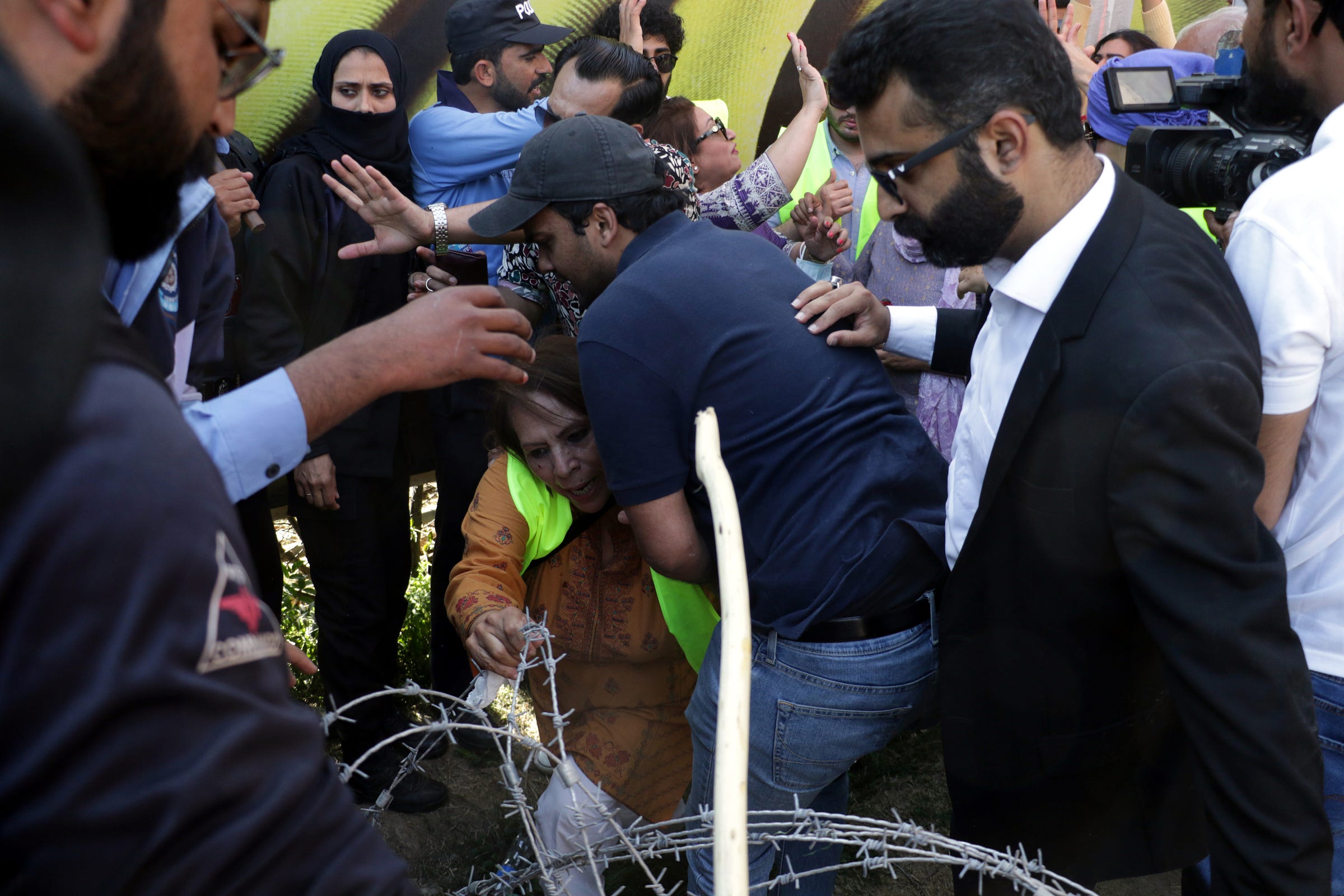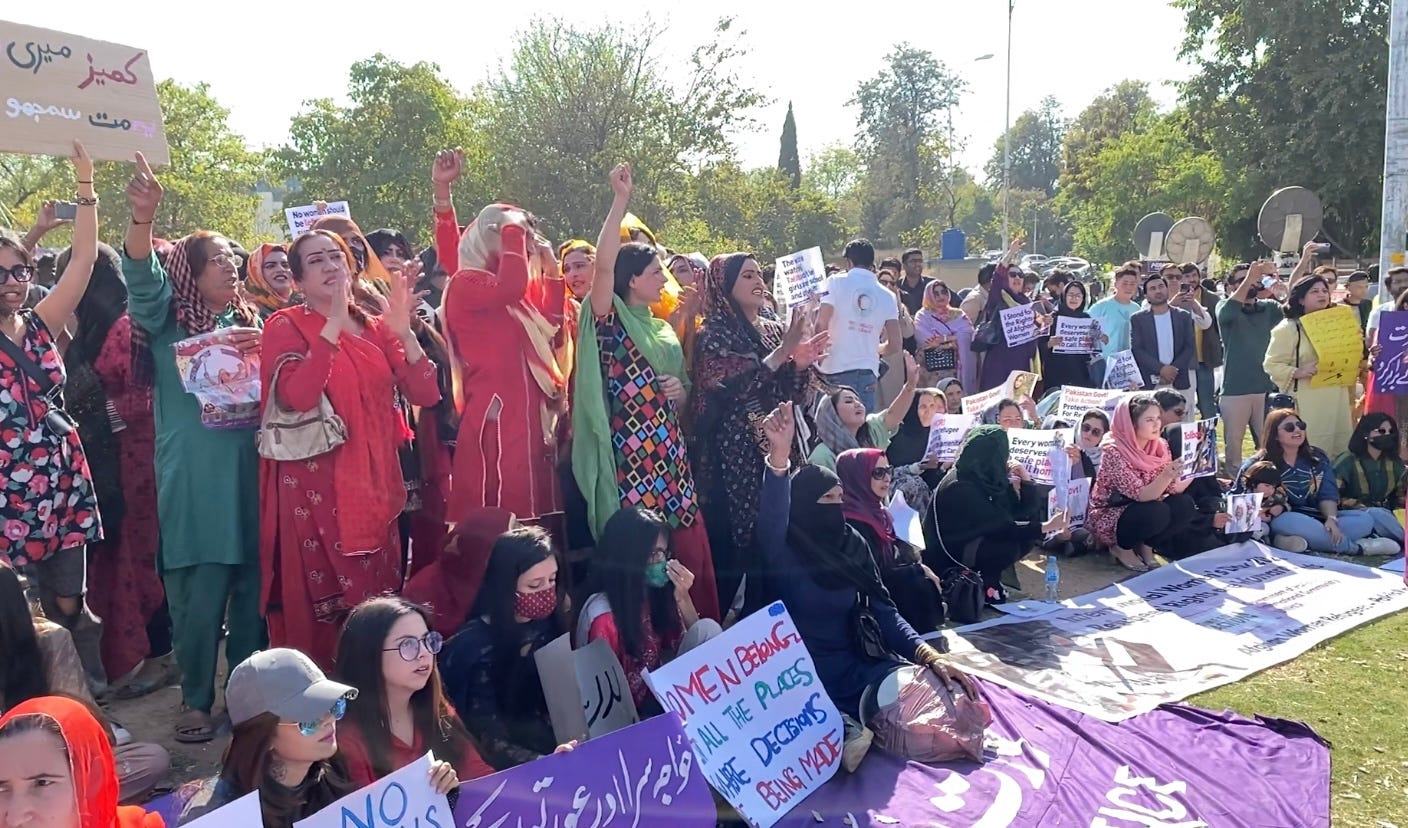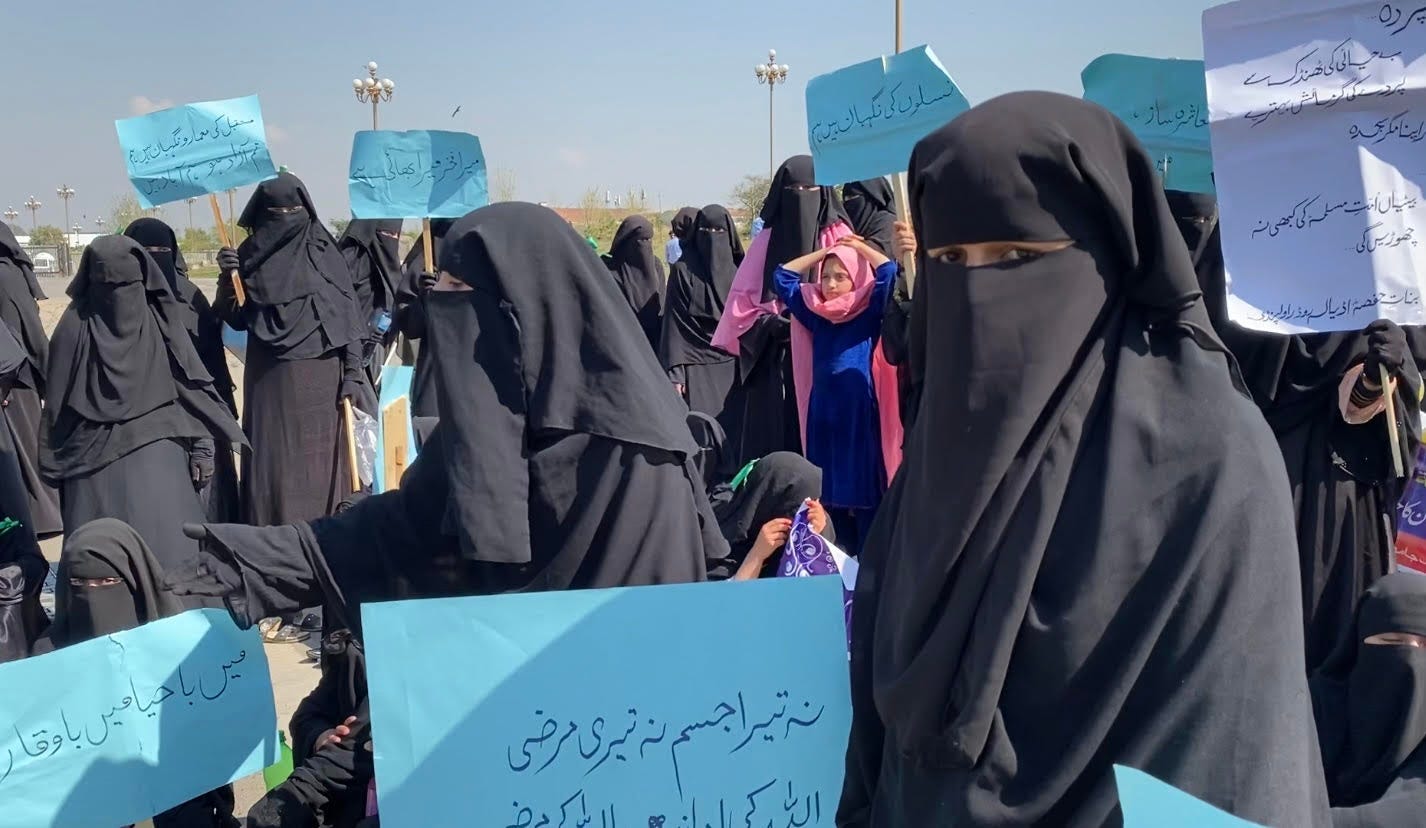‘We risked our lives’: Inside Pakistan’s most radical feminist movement
Activists from the Aurat March are shunned, falsely accused and pelted with stones – but they say won’t stop.
Only have a minute to read this newsletter? Here it is in brief:
- The Aurat March is the most radical – and most controversial – Pakistani women’s rights movement in recent history.
- Every year, protesters take to the streets to demand equal treatment at home, at work and in the justice system for women and trans people.
- Members of the movement face intimidation, violence and rejection by their families for their activism, but they are undeterred so far.
Read on for more. And if you want to stay up-to-date on feminism worldwide, follow us on Twitter and Instagram.
Parlez-vous français ? Impact is also available in French:
By Beenish Javed
“Don’t touch me, don’t touch me!”’, a police officer yelled at a protester demanding access to a planned protest space outside the National Press Club in Islamabad. He shoved her roughly. Seconds later, police baton-charged the protesters from the Aurat March — which means “women’s march” in Urdu — who had gathered at the club to mark International Women’s Day.
Marchers claim the police had surrounded them and closed off all entrance points. Several women, including members of the transgender community, were injured in the crackdown and many left the protest bruised. The local administration had not granted official permission to hold the demonstration, due to fears of clashes with counter-protesters from right-wing religious groups. But the Aurat marchers carried out the protest anyway.
During the scuffles with police, one of the protest organisers, 66-year-old Farzana Bari, tore open a section of barbed wire encircling the protest space. Despite being beaten by the police, this small opening allowed demonstrators to briefly move through. The women crossed the blockade and staged their protest.

The Aurat March exploded onto the political scene in Pakistan on March 8, 2018 with demonstrations in Karachi. Now, protesters of all ages come out every International Women’s Day in all of Pakistan’s major cities to demand greater rights, even in traditionally conservative places such as Peshawar in the northwest.
The movement was born after women rights activists formed a consensus that they needed to claim more political space.
“The desire to be involved in decision-making, and to express and stand for our rights led us to hold Aurat March in 2018,” one 72-year-old founding member from the southern city of Karachi told the Impact newsletter (organisers of the Karachi chapter of Aurat March are anonymous due to the personal threats they receive). “We were inspired by the marches taking place in the US and other parts of the world.”
Pakistan is considered one of the most dangerous countries in the world to be a woman. As many as 1,000 women are killed each year in so-called “honour killings”, according to human rights groups. Domestic violence is prevalent, and Pakistan ranks second-last, above only Afghanistan, on gender equality in the Global Gender Gap Index. Most institutions are male-dominated, including the parliament, police, and the judiciary, and women represent just 23% of the workforce.
The ferocity of the Aurat March has shocked many in the conservative country, and triggered an often violent backlash. Unlike previous women’s rights campaigns in Pakistan, which confined themselves to highlighting the discriminatory policies and laws of the state, the Aurat marchers have extended their protests into the domain of the home to question power dynamics within family structures. They demand equal treatment for girls and boys, and say husbands should take responsibility for household chores. They talk about taboo issues such as domestic violence, marital rape, and sexual harassment.
Bari says raising these issues unsettles patriarchal mindsets. “Men who consider women as their property feel threatened that these women’s rights activists might break their families. It makes them anxious.”
The Aurat March also advocates for the trans community in Pakistan, which has vanishingly little representation in the country’s institutions. A groundbreaking 2018 law allows people to identify as male, female or “third gender” and protects trans people from discrimination in public. But in reality, they are at great risk of violence and shunned by Pakistani society. Many are forced into sex work or begging to make a living. The Aurat March also campaigns on issues such as forced disappearances, for which the country’s powerful military establishment is often blamed.

The backlash against the movement has been severe, and Aurat marchers have been fiercely criticised for their bold and unapologetic approach. Women who take part face humiliation, intimidation and rejection from religious groups and their families for their association with the movement.
At the rally in Islamabad this year, the force of the police response was partially due to the presence of a counter-march by members of right-wing religious groups including the Red mosque and political party Jamaat e Islami. This counter-protest has been taking place simultaneously with the Aurat March for the past few years. Women protesters clad in burqas demand an Islamic Pakistan where women stay at home and take care of their families.
Representatives of the Aurat March claim that on International Women’s Day in 2020, men and women from several religious groups pelted marchers with sticks and stones as they marched through the capital. One of the most dangerous militant organisations in the country, Tehreek e Taliban Pakistan has threatened women activists, including Bari. In 2021 after the annual march, the Taliban accused women marchers of blasphemy and obscenity.
The opposition is so intense that in 2021, a video in which women at the Aurat March in Karachi were calling for freedom from oppression by clerics and politicians was doctored to make it seem they were saying they would take their freedom from Allah and the prophet Muhammad. This led to marchers being charged with blasphemy, which carries the death penalty in Pakistan. The subsequent court case took several months.
“Each time we went to court for a hearing, we risked our lives. There was a real fear that any fanatic might appear and kill us,” Bari told the Impact newsletter. The courts finally cleared the Aurat marchers of the charge.

Participating in marches can also lead to heated discussions at home for marchers. “Joining Aurat March became so contentious that some of the relatives and friends who disapproved of the march cut their ties with me,” said 24-year-old Rida Zulfiqar, who marched in Islamabad holding a placard that read, “My body, my choice.”
This is one of the most controversial slogans of the Aurat March. Opponents claim the slogan proves women marchers are on a mission to destroy Islamic values. But Zulfiqar told Impact that, for her, the slogan means women should have agency over their bodies and their consent should be respected.
At the 2019 march in Islamabad, 30-year-old Bariya Shah, from the northern town of Chitra, l carried a placard in her native language, Khowar, which read: “wash your clothes and your dishes yourself”. Shah posted her picture on Facebook and it quickly went viral in her tight-knit community.
“My family didn’t speak to me for over a month and even my mother who always supported me got upset because all sorts of bad things were being said about me,” Shah said.
But there is an upside to the controversy. The anonymous organiser from Karachi says that despite the setbacks, the criticism and controversies about Aurat March have also led to it becoming more popular and recognised among the wider public.
At the marches, feminists often sing a song, the lyrics of which say, “for so long you kept suffering silently and your world didn’t change, your world will change only when you speak up.” For young activists like Zulfiqar and Shah, that’s the message they take away from this new wave of feminism.
“Through our slogans, placards, and songs, we are slowly bringing a change to Pakistani society,” Shah said.
— Beenish Javed is a TV reporter. She tweets about political, economic and social issues from Pakistan and the South Asian region at @beenishjaved.